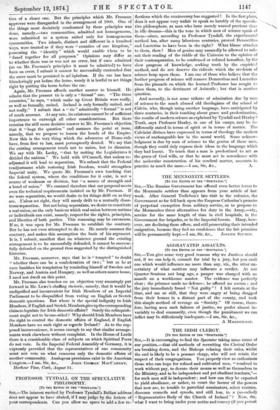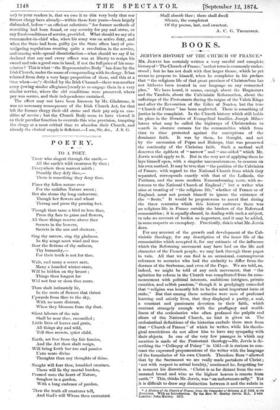THE IRISH CLERGY.
[To THE EDITOR OF THE "SPECTATOR.'] SIR,—It is encouraging to find the Spectator taking some count of our position,—that old methods of recruiting the Clerical Order are breaking down, and the Bishops relaxing their rules, whilst the end is likely to be a peasant clergy, who will not retain the respect of their congregations. You properly view as enthusiasts those who can hope for refined and cultivated men, "resolved to work without pay, to devote their means as well as themselves to the Ministry, and to be independent and yet obedient teachers,"— for such men will be independent ; and how can they be expected to yield obedience, or rather, to court the favour of the powers that now are, to truckle to parochial nominators, select vestries, diocesan councils and synods, and still less, to a (so-called) "Representative Body of the Church of Ireland " ? Now, Sir, what I want to bring under your notice and convey (if you permit
me) to your readers is, that we owe it to this very body that our former clergy have already—within these four years—been lafgely disbanded, before "an efficient substitute "for former methods of recruiting had been found, or any security for pay and status, or any fixed conditions of service, provided. What should we say of a commander-in-chief who, when his army was on active duty, and when the State had been guilty (as the State often has) of pro- mulgating regulations creating quite a revolution in the service, and causing wide-spread dissatisfaction—what should we say if he declared that any and every officer was at liberty to resign his sword and take a good sum in hand, if not the full price of his com- mission? This is what "the Representative Body" has done by the Irish Church, under the name of compounding with its clergy. It has released from duty a very large proportion of them, and this at a time when—on'y divided by the Irish Channel—there was another army (owing similar allegiance) ready to re-engage them in a very similar service, where the old conditions were preserved, where pay was secure, and their independence sustained.
The effect may not have been foreseen by Mr. Gladstone, it was no necessary consequence of the Irish Church Act, for that left the former clergy their old status and their pay only on con- dition of service ; but the Church Body seem to have viewed it as their peculiar function to overrule this wise provision, tempting the clergy at a most critical time to abandon their Church, and already the clerical supply is deficient.—I am, Sir, &c., J. S. G.































 Previous page
Previous page